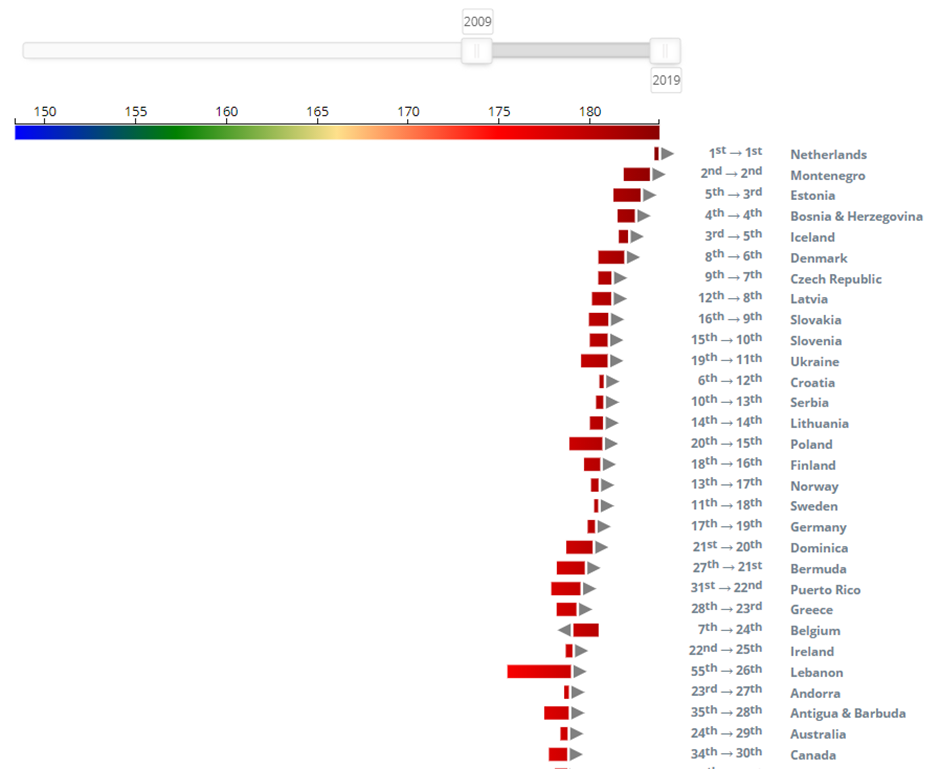What is the average Canadian male’s height?
As of the time of this writing, Canada has a population of over 38 million. The male population accounts for around 49.7%.
According to Statistics Canada, the average male height in Canada is five feet, 10.1 inches, or exactly 178.1 cm.
Compare Canadian men’s height with other countries’
An average Canadian man’s height is considered relatively tall compared with other countries in the world. Recent years’ male height ranking data shows Canadian men’s height has gone from 34th place to 30th place.

Looking at the raw data table below, it is not hard to find that European countries dominate the average male height ranking in the world. However, Canada is not far behind. The difference between the Netherlands and Canada is only about 6 cm. Another interesting factor is that the average male height in Asian countries is relatively shorter than in European countries.
| Country | Average height |
| Netherlands | 1.84 m |
| Montenegro | 1.83 m |
| Estonia | 1.82 m |
| Denmark | 1.82 m |
| Sweden | 1.80 m |
| Norway | 1.80 m |
| Lithuania | 1.80 m |
| Poland | 1.80 m |
| Ukraine | 1.80 m |
| Finland | 1.80 m |
| Latvia | 1.80 m |
| Bermuda | 1.79 m |
| Greece | 1.79 m |
| Puerto Rico | 1.79 m |
| Switzerland | 1.79 m |
| Australia | 1.79 m |
| Ireland | 1.79 m |
| Canada | 1.78 m |
| Zimbabwe | 1.70 m |
| Kenya | 1.70 m |
| Nigeria | 1.70 m |
| Ghana | 1.69 m |
| Nauru | 1.69 m |
| Micronesia | 1.69 m |
| South Africa | 1.69 m |
| Malaysia | 1.68 m |
| Central Africa | 1.68 m |
| Vietnam | 1.68 m |
Male height growth history
The height of men and women has been steadily increasing since the 19th century. The main factors for this change were industrialization and urbanization. As people moved from rural areas to cities, there was more food available and less physical labour required, which increased their height. The other factors are better nutrition, improved sanitation, better health care, more protein intake, and an increase in physical activity outside of work hours.
The average height of a Canadian male has grown by half an inch since the 1960s. The average height in Canada is now 5’10.7″, up from 5’10.2″ in the 1960s.
When looking at the recent years’ growth history between 2009 and 2019, based on the data from the NCD Risk Factor Collaboration, the average male height has grown from 177cm to 178cm.
Based on current trends, it is estimated the average male’s height in Canada will remain at 178 cm in 2023.
What are the health issues associated with height?
Being too short or too tall can have a lot of health risks. People who are too short are at risk of developing scoliosis and other spinal problems, while people who are too tall are more susceptible to heart disease, cancer, and diabetes.
A person’s height is not the most important factor in their life. It is, however, a very important factor in their health. A taller person will require less effort to maintain a healthy weight and have better cardiovascular health.
What are the factors that will impact a male’s height?
There are many factors that can affect height, and it is important to understand how they work to fully grasp how height is determined.
A person’s body grows because of several processes that are regulated by hormones and DNA. The growth plates in a person’s bones are responsible for increasing height, yet these plates can only extend so far before stopping. As a result, some people cease developing at various phases of their lives more than others. According to data, elderly people are shorter on average than younger adults.
Genes are not the sole element that influences a person’s height. There are several lifestyle factors that contribute to some boys’ inability to grow taller.
Some of these reasons include:
- Poor nutrition can lead to stunted growth.
- Lack of physical activity, which can lead to a lack of muscle mass.
- Poor posture and sitting habits.
- Stress in early childhood
References
Statistics Canada: https://www.statcan.gc.ca/en/start
NCD Risk Factor: https://ncdrisc.org/height-mean-ranking.html .
